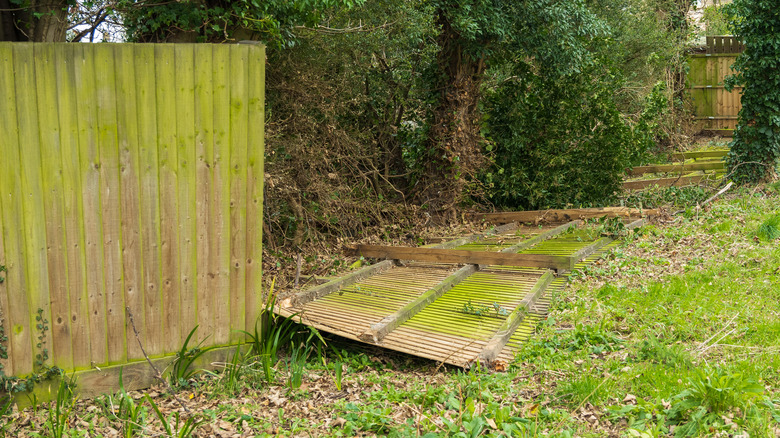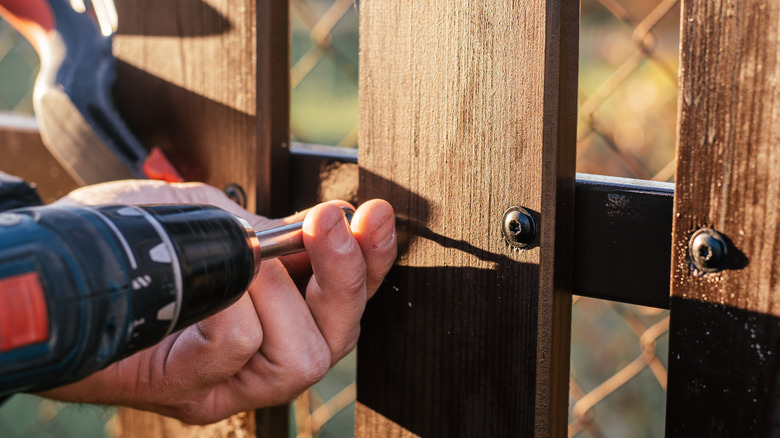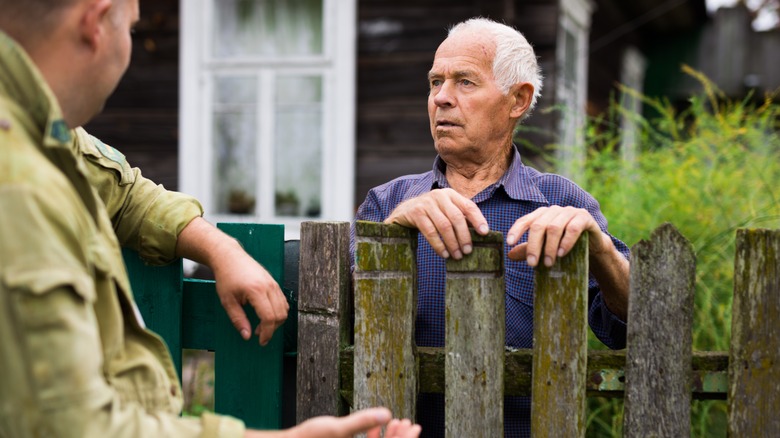What To Do About A Neighbor's Damaged Or Fallen Fence
Whether a bad storm recently blew through your area or you simply have a negligent neighbor, discovering a damaged or fallen fence on your property can quickly become a nightmare. It can be confusing and stressful to figure out who owns the fence and, potentially, despite that, who gets stuck footing the bill for the repair. But before you grab your hammer or call up a contractor, pause and take a breather because the key to getting this delicate issue resolved quickly is by staying calm and logical, and by following these clear steps for communicating about and assessing it.
The very first step you need to take is officially determining who owns the fence. If you already know this, that's fantastic; go ahead and move to the next step. If you don't, you will need to check at an official property survey or plat map from your local county recorder's office. These documents show the exact property boundary, which can then tell you whose property the fence is on or if it's split halfway on the boundary line as a shared fence, which is often the best way to install a fence to make both you and your neighbor happy.
However, we should make a brief note about local "Good Neighbor" fence laws, which usually assume shared responsibility and cost for a boundary fence. There's a lot to consider when it comes to good neighbor fences, and they may dictate shared repair costs in this situation, even if only one of you owns it. That is another item you will likely need to research in this process.
How to document the fence's damage and find repair costs
Once you have figured out fence ownership, the next step is to thoroughly document the scene and understand the estimated scope of the repair costs before you tag in your neighbor. Here, start by taking a variety of clear photos and videos (you can use a dedicated camera, but your smartphone should work fine if it has a decent-enough camera). Make sure you get wide shots and close-ups, plus shots of anything on your property that was damaged because of the fence. Be sure to note the date and time, too. All this documentation is super important to have for this whole process, especially if things end up in legal territory. It's important to note that fence laws vary by region.
After you collect your documentation, you can find out what the actual cost for repairs is. We recommend talking with at least two or three reputable local fencing contractors for detailed estimates. Having multiple estimates makes it easier to find the lowest price and, maybe more importantly, stops your neighbor from accusing you of choosing the most expensive option. Depending on what caused the fence to fall, note that homeowners' insurance may be a part of the process as well. Regardless, both the documentation and estimates go a long way in helping your conversation with your neighbor stay logical and solution-oriented, not emotional.
How to communicate with your neighbor to resolve things
As we mentioned briefly up top, the most important part of this whole process is making sure you stay calm, friendly, and non-confrontational as you chat with your neighbor about all this. With all of your documentation in hand, approach your neighbor with a friendly attitude and an earnest desire to find a solution peacefully. Start the conversation by stating that you know this is a situation that affects both of you, show them your photos, and share your repair estimates as options (not demands); be open to them wanting to get estimates of their own, too.
Remember that your goal is to hammer out the details for three things: what needs to be fixed, the timeline, and who pays for what. Once you come to a verbal understanding, we can't recommend enough putting everything in writing and you both signing the document. That document is what makes everything work, in that it prevents future misunderstandings by protecting both you and your neighbor, and formalizing your commitment to actually getting the fence fixed.
However, if you are unable to come to an agreement with your neighbor for some reason (hey, it happens, sometimes you just have a difficult neighbor), you may need to look up your city ordinances and even consider formal mediation, or exploring your legal avenues. Ultimately, a respectful conversation is the cheapest, quickest, and easiest way to patch up your fence.


